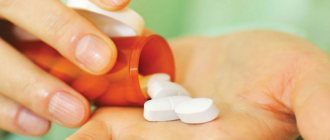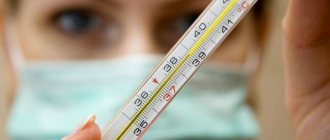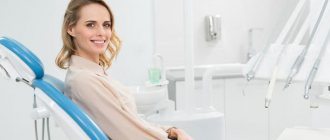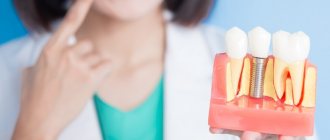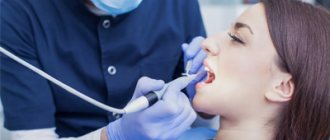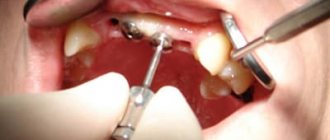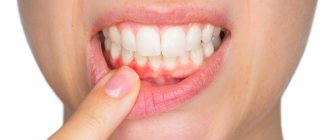Antibiotics for implantation can be prescribed both before and after installation of implants, depending on the clinical picture. Their use can significantly reduce the risk of developing inflammatory processes and reduce the likelihood of complications after implantation, including rejection of installed structures.
Getting a new smile doesn’t end with implant surgery. In order for the rehabilitation period to be as successful as possible, without tissue inflammation, and for the implant to take root safely, doctors must prescribe medications, including antibacterial drugs.
What not to do after dental implantation
First of all, you need to pay attention to the prohibitions during the rehabilitation period. Most of them act in the first one or two weeks when the wound is healing. Some actions can cause bleeding, suture rupture, and hematoma formation.
Forbidden:
- eat spicy, hard, hot or too cold food;
- touch the area of the wound or the installed implant;
- drink through a straw;
- chew on the side of the jaw where surgery was performed;
- use a toothbrush with stiff bristles;
- fly by plane, dive into the depths with scuba gear, especially when performing a sinus lift;
- smoke;
- drink alcoholic beverages;
- high physical activity: sports, heavy physical labor;
- overheat the body: go to the bathhouse, sauna, sunbathe on the beach, take a hot bath;
- supercool;
- ignore taking prescribed medications.
The rules are especially relevant after flap surgery, which is performed during the classical installation of implants. However, even with a minimally invasive procedure using one-stage protocols (one-step, basal), you should not neglect medical recommendations.
Medicinal substances and requirements for them
Antibiotics for implantation, as already noted, can belong to three types - antibacterial, antifungal and antiprotozoal agents. Some substances have a combined effect - for example, they simultaneously affect both parasites and certain bacteria. Also, one drug can combine several substances (usually antibacterial), which act in combination on different groups of pathogens. But any antibiotics must meet the following requirements:
- effective impact,
- minimal risk of allergic reactions,
- modern production from purified raw materials,
- minimum number of contraindications,
- minimal side effects,
- convenient form of administration: as a rule, drugs are presented in the form of suspensions or tablets, film-coated or dispersible. The latter disintegrate into tiny particles upon contact with liquid - water or saliva.
How to relieve swelling after dental implantation
After surgery, the soft tissue in the surgical area swells. This is a normal reaction of the body. Swelling can spread to the tongue, chin, cheeks, causing the face on the side of the installed implant to look swollen. In this case, the patient feels numbness, but normally it should last no more than two or three days. If the symptom lasts longer, it may indicate nerve damage. The most effective way to relieve severe swelling is a cold compress. You can use ice or frozen food from the freezer. Ice is wrapped in a towel and applied to swollen tissues for 10 - 15 minutes. Carry out the procedure several times a day. Do not overdo it with an ice compress, otherwise you can overcool the tissues.
You need to exclude foods that increase swelling from your diet. You cannot eat spicy, salty foods, add spices to your food, or drink coffee. For example, the latter product increases blood pressure, blood rushes to the head, swelling intensifies, and bleeding from the wound may begin.
If the swelling does not go away within three or four days, the pain does not subside, redness of the mucous membranes is observed, pus and fistulas appear, then these are symptoms of peri-implantitis. It is necessary to urgently consult a doctor. Self-treatment can worsen the situation, including implant rejection.
The operation and its effect on the body
Dental implantation is a complex operation, the task of which is to restore natural teeth lost for any reason and their chewing ability. As a rule, implantation involves cutting the gums, building up bone tissue and then placing sutures at the incision site. In order for the body to recover more quickly after such an intervention, certain rules should be followed.
Pain and swelling after the procedure are completely normal. These symptoms may worsen after the anesthesia wears off (several hours after surgery). If the discomfort subsides after a couple of days, then there is no reason to worry. However, there are situations when the pain and redness of the tissues only intensify over time.
In this case, a specialist may prescribe antibiotics. They reduce inflammation and fight pathogenic microorganisms that enter the wound during or after surgery. In addition, these drugs can also be prescribed for prophylaxis along with painkillers and antihistamines.
Antibiotics and other medications after dental implantation
Antibacterial drugs are prescribed to prevent the development of infection. Some doctors believe that you should only take antibiotics if you are at high risk, for example, if your immune system is reduced, you have chronic diseases of the upper respiratory tract, periodontitis, or you have had several implants installed at once. However, many dentists insist on the need for antibiotic therapy.
For the purpose of prevention, broad-spectrum drugs are prescribed: penicillins, cephalosporins. The doctor can prescribe any available drugs: Lincomycin, Amoxiclav, Flemoxin, Tsifran ST. Antibiotics must be taken strictly according to the schedule, in the appropriate dosage.
To prevent or relieve inflammatory processes, ointments or gels for external use are prescribed: Metronidazole, Solcoseryl. The latter drug improves metabolic processes in tissues and promotes rapid healing of wounds.
In the first weeks of the rehabilitation period, it is recommended to rinse your mouth after eating with antiseptic solutions: Chlorhexidine, Miramistin and their analogues. You can prepare decoctions of medicinal herbs: oak bark, chamomile, calendula, sage.
How to use
All antibiotics have a number of contraindications for use, which, if ignored, can lead to serious consequences and health problems. The instructions for the drug are required reading . If it is written in a foreign language and there is no translation, such medicines cannot be purchased. Their sale is prohibited by law , and the risk of purchasing a low-quality drug increases many times over.
When prescribing a remedy, the doctor must first carefully examine the patient’s medical history. Otherwise, the development of various negative reactions of the body is possible.
If the medication contains a component that is an allergen for the patient, even death is possible.
You need to take the medicine with food (unless the instructions indicate a different dosage regimen). Thus, the active substance is absorbed into the blood from the gastrointestinal tract gradually. The prescribed drug should be taken based on the instructions of the implantologist, however, there are a number of general recommendations for most antibacterial drugs:
- Do not exceed the dose prescribed by the doctor , even if the drug is absorbed normally. An overdose may cause side effects.
- The appointment period should not exceed the time recommended by the implantologist . As a rule, the course of antibiotic therapy lasts 7 days. Longer use can cause various side effects, for example, intestinal upset or resistance of microorganisms to antibiotics of this group.
What you can and cannot eat after dental implantation
On the first day of surgery, you can eat after three or four hours, when the wound has healed. Food should be liquid or pureed, at a comfortable temperature. You should not eat foods that can injure the mucous membranes. The diet must be followed for at least three weeks.
During the recovery period you need to eat:
- soft or liquid food: you can puree foods with a blender, buy baby food in jars;
- foods rich in calcium and vitamins;
- warm food;
- drink plenty of fluids.
You cannot eat seeds, nuts, sour, salty, spicy foods, sweets, alcohol, coffee, hot or cold foods. Smoking is strictly prohibited.
When are sutures removed after dental implantation?
The date of suture removal is determined by the doctor, focusing on the condition of the gum tissue. Usually the procedure is prescribed after 10 - 14 days. If the wound does not heal well, this time can be increased to three weeks.
Sutures should not remain in the gums for too long, as this can lead to the development of inflammatory processes. Self-absorbing suture material does not need to be removed.
How to remove stitches:
- treat the oral mucosa with antiseptics;
- cut the thread stitches in half;
- remove the cut material with tweezers;
- antiseptic treatment is repeated;
- apply a sterile bandage.
Small wounds in the gums heal after one or two days. At this time, discomfort and pain may occur.
If the stitches come apart, they are removed immediately. This phenomenon usually occurs with severe inflammation.
Indications for use
According to the results of statistical studies, the most common factor in the occurrence of complications after implantation is a violation of the natural state of the oral microflora. The quality of the surgical protocol is also affected, depending on the qualifications of the doctor, as well as the quality of the instruments and materials used. Indications for prescribing antibiotics are usually:
- Insufficient compliance with hygiene regulations;
- Improper processing of crowns and implants;
- Choosing an accelerated prosthetic technique;
- Implementation of the procedure in the presence of periodontal diseases;
- Exacerbation of chronic pathologies of the nasopharynx;
- Weakened state of the immune system;
- Carrying out surgery to increase the volume of bone tissue.
After making sure that there are no contraindications, the doctor determines the optimal list of medications that can have a positive effect on the patient’s condition.
How to brush your teeth after implantation
One of the most important issues concerns oral hygiene in the postoperative period. Teeth should be brushed carefully, avoiding the operated area. It is recommended to use a brush with soft bristles, which cannot injure the mucous membranes of the mouth. Hygiene procedures should be carried out in the morning and evening. When brushing your teeth, you should not forget to remove plaque from the tongue, palate and the inside of the cheeks.
In the first week after eating, it is recommended to rinse the mouth with antiseptics, and then with mouth rinses. When the wound has healed, you can use brushes, dental floss, and irrigators to clean your teeth.
Carrying out the operation
Each patient who will undergo surgery is individual. For some it is carried out in one stage, but sometimes there is a need for several. Therefore, before surgery, a complete examination of the patient takes place. This is necessary to identify contraindications. In some cases, the doctor performs osteoplasty so that the implant is securely fixed. To ensure that the postoperative period passes without complications, a course of antibiotics is prescribed. This prevents inflammatory processes and restores bone tissue.
Why do headaches occur after dental implantation?
Surgery is accompanied by various ailments, including headaches. This is due to the activation of the body's immune system. In some patients, along with pain, body temperature rises.
Normally, the head may hurt for three days. At this time, you need to take painkillers. If the symptom persists for more than four days, it may indicate inflammation around the implant or an allergic reaction to metals.
If, in addition to pain in the mouth, there is a metallic taste, bitterness, sleep is disturbed, and constant weakness is felt, then you should consult a doctor.
Side effect
The use of antibiotics can cause side effects, especially if the regimen prescribed by the doctor has not been followed. Drugs in this group can cause the following negative consequences:
- Allergic reaction , manifested by skin rash, itching and other symptoms.
- Dysbacteriosis caused by the effect of antibiotics on beneficial bacteria living in the intestines, as a result of which its normal microflora is disrupted.
- Mycoses , provoked by strong proliferation of fungi caused by the destruction of natural bacterial microflora.
- Disturbances in the functioning of body systems and organs.
- Acquisition of resistance by pathogenic microorganisms to the action of antibiotics.
»
If any side effect occurs, the patient must stop using the drug and report the body’s reaction to the doctor. If treatment without antibiotics cannot be continued, another appropriate medication will be prescribed.
Unpleasant sensations after installing a dental implant
Since the gum tissue is severely injured, the patient feels pain for several days. There may be a feeling of fullness and pressure. This is considered normal, since a foreign element was installed in the gum. Unpleasant sensations can persist for one, two weeks or longer, it all depends on the individual characteristics of the body.
Some patients complain that the installed chewing teeth put pressure on the tongue. This may be a subjective sensation, since after removal of the painters the implantation site was empty. Perhaps an error was made during the manufacture of the prostheses. To clarify the issue, you need to consult a doctor.
Adverse reactions you may encounter when taking antibiotics during implantation
All antibacterial compounds have a large number of adverse reactions. Most often this is:
- allergies, skin rashes and itching of the whole body;
- diarrhea;
- stomach pain;
- nausea;
- headache;
- increased sweating;
- insomnia;
- decreased appetite;
- fungal infections.
If a person understands that the medication prescribed by implantologists is not suitable for him, he needs to make an appointment with the dentist and discuss the issue of replacing it.
How long does it take for dental implants to take root?
The processes of osseointegration depend on various factors: the patient’s health status, implantation method, type, brand of implantation system. Conventional classical implants take root in the lower jaw within 3.4 months, in the maxillary region - 5.6 months, since the upper jaw bone is less dense.
Some premium implant models have a special coating that accelerates osseointegration processes. If dental structures are made of pure titanium, then healing occurs faster.
What else do patients ask about after implantation?
Since the installation of implants is a surgical operation, people are interested in many questions about the rehabilitation period.
- Does it hurt to remove stitches? The procedure is carried out after the wound has healed, so removing thin threads does not cause pain. If the patient experiences severe fear, the doctor may treat the suture area with an anesthetic gel or spray.
- Why is smoking prohibited after implantation? Nicotine constricts blood vessels, slows down metabolic processes, and impairs tissue nutrition. This negatively affects wound healing and implant healing. If the patient cannot quit smoking for a long time, the doctor has the right to refuse surgery.
- Why is Dexamethasone prescribed after implantation? The drug can be used as a powerful pain reliever. If the risk of inflammation is very high, then Dexamethasone is prescribed along with antibiotics. The drug quickly stops inflammatory processes and alleviates acute symptoms.
- How long does a tooth hurt after implant placement? Painful sensations persist for 3 - 5 days. If the pain is severe, you can take painkillers.
General overview
A mandatory condition prior to implantation is a comprehensive clinical diagnosis, which makes it possible to identify and exclude possible medical contraindications. In situations where the condition of the bone tissue does not allow for the successful integration of titanium pins replacing the root part of the missing tooth, the osteoplasty technique is used - increasing and compacting the volume. During surgery, the gums are cut, which increases the risk of infection and therefore requires special care.
Antibiotics, the purpose of which is also to stimulate the process of regeneration and osseointegration, can be used to avoid inflammation of the tissues around and inside the intervention area. The therapeutic course is drawn up based on the results of an analysis of the patient’s medical history.
